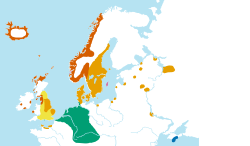English language: Difference between revisions
mNo edit summary |
|||
| Line 1: | Line 1: | ||
== English word origin == | == English word origin == | ||
==== Angles / Anglo-Saxon ==== | |||
* from the Angles, a Germanic peoples who migrated to the British Islands in the 400s-600s AD. | * from the Angles, a Germanic peoples who migrated to the British Islands in the 400s-600s AD. | ||
** part of the Anglo-Saxon invasions | ** part of the Anglo-Saxon invasions | ||
* English is one of the "Anglo-Frisian" languages | * English is one of the "Anglo-Frisian" languages | ||
==== Language origins of Modern English ==== | |||
{| class="wikitable" | |||
|+Origins of Modern English | |||
!Germanic | |||
!Old French | |||
!Latin | |||
!Greek | |||
!Other | |||
!Proper Names | |||
|- | |||
|26% | |||
|29% | |||
|29% | |||
|6% | |||
|6% | |||
|4% | |||
|} | |||
[[Image:Old norse, ca 900.svg|right|250px|thumb| | [[Image:Old norse, ca 900.svg|right|250px|thumb| | ||
The approximate extent of Old Norse and related languages in the early 10th century:<br> | The approximate extent of Old Norse and related languages in the early 10th century:<br> | ||
| Line 17: | Line 36: | ||
* English contains 170,000 to 220,000 words (when obsolete words are counted) | * English contains 170,000 to 220,000 words (when obsolete words are counted) | ||
** when technical terms, mostly from Latin and Greek, are counted, there are about 1 million words | ** when technical terms, mostly from Latin and Greek, are counted, there are about 1 million words | ||
{| class="wikitable" | |||
|+English Language Percent Distribution of Parts of Speech | |||
!Adjectives | |||
!Adverbs | |||
!Conjunctions | |||
!Determiners | |||
!Nouns | |||
!Prepositions | |||
!Pronouns | |||
!Verbs | |||
|- | |||
|2.5 | |||
|5 | |||
|4.5 | |||
|4.5 | |||
|50% | |||
| | |||
| | |||
|7% | |||
|- | |||
| | |||
| | |||
| | |||
| | |||
| | |||
| | |||
| | |||
| | |||
|- | |||
| | |||
| | |||
| | |||
| | |||
| | |||
| | |||
| | |||
| | |||
|} | |||
{| class="wikitable" | {| class="wikitable" | ||
|+ | |+English Language Percent Distribution of Parts of Speech | ||
!Adjectives | !Adjectives | ||
!Adverbs | !Adverbs | ||
!Conjunctions | |||
!Determiners | |||
!Nouns | !Nouns | ||
!Prepositions | !Prepositions | ||
!Pronouns | |||
!Verbs | !Verbs | ||
|- | |- | ||
| | |2.5 | ||
|5 | |||
|4.5 | |||
|4.5 | |||
|50% | |||
| | | | ||
| | | | ||
|7% | |7% | ||
|- | |- | ||
| | |||
| | |||
| | |||
| | | | ||
| | | | ||
| Line 38: | Line 105: | ||
| | | | ||
|- | |- | ||
| | |||
| | |||
| | |||
| | | | ||
| | | | ||
| Line 44: | Line 114: | ||
| | | | ||
|} | |} | ||
[[Category:Language Arts]] | [[Category:Language Arts]] | ||
[[Category:Linguistics]] | [[Category:Linguistics]] | ||
[[Category:Language]] | [[Category:Language]] | ||
Revision as of 16:31, 10 April 2023
English word origin[edit | edit source]
Angles / Anglo-Saxon[edit | edit source]
- from the Angles, a Germanic peoples who migrated to the British Islands in the 400s-600s AD.
- part of the Anglo-Saxon invasions
- English is one of the "Anglo-Frisian" languages
Language origins of Modern English[edit | edit source]
| Germanic | Old French | Latin | Greek | Other | Proper Names |
|---|---|---|---|---|---|
| 26% | 29% | 29% | 6% | 6% | 4% |

Old West Norse dialect
Old East Norse dialect
Old Gutnish dialect
Old English
Crimean Gothic
Other Germanic languages with which Old Norse still retained some mutual intelligibility
English vocabulary[edit | edit source]
- English contains 170,000 to 220,000 words (when obsolete words are counted)
- when technical terms, mostly from Latin and Greek, are counted, there are about 1 million words
| Adjectives | Adverbs | Conjunctions | Determiners | Nouns | Prepositions | Pronouns | Verbs |
|---|---|---|---|---|---|---|---|
| 2.5 | 5 | 4.5 | 4.5 | 50% | 7% | ||
| Adjectives | Adverbs | Conjunctions | Determiners | Nouns | Prepositions | Pronouns | Verbs |
|---|---|---|---|---|---|---|---|
| 2.5 | 5 | 4.5 | 4.5 | 50% | 7% | ||